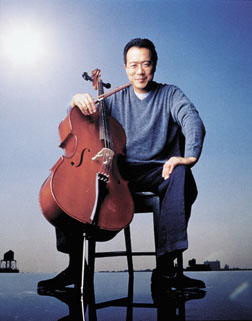
Cellist Yo Yo Ma
Obtaining a job with a leading professional orchestra is as competitive as trying to be a professional Major League Baseball player or NASA astronaut. The struggle to get a coveted seat in the orchestra pit is stiff. You better have musical chops, as professional cellist Kyle Champion notes, because in the music world, it’s less about whom you know than what you know and how you play. For the audition, an orchestra’s management often goes to great lengths to preserve this spirit of equality and democracy. It’s a Darwinian survival of the most artistically gifted.
Champion describes the intense, even brutal, audition process:
“Let’s say a notice goes out that there’s an open cello position in the orchestra. Interested parties will submit their resumes and ask for the list of required pieces that they will have to learn for the audition, for example, parts of Beethoven’s 5th, parts of Brahms’ 2nd Symphony, Richard Strauss’ Don Juan. The list may be long or short. You have roughly a month to prepare and, perhaps, a solo piece as well.
“At the audition, there might be 25 or 30 people. Everyone draws a number. From that point, you are known by your number, not your name. When your number is called, you walk out on stage and play, but you’re blocked by a screen. The audition committee doesn’t know whether you’re black, white, green, red … whether you’re male or female … whether you’re 10-feet tall or 3-feet short. It’s a blind audition. You’re judged based on what they hear. Do you play well and with expression? Are you in tune and in time? Will you be a good fit for their orchestra?
“There may be two or three rounds like that. Each round, you’re totally screened. They might weed down the group to three or four performers. At that point, they might take the screen away and say, ‘Let’s see what we’re getting here.’ Other organizations keep up the screen all the way through the audition process.
“The No. 1 choice is offered a contract with the orchestra, but then you’re on probation – usually it’s a season to perform with the orchestra, sometimes it’s two seasons, so they have longer to get to know you and observe how well you play and get along with others in the group. If you’re not a fit, you can be released, no questions are asked. It’s just a thank you, we appreciate your time, and they go through the process again.
“If pass your probation, you’re offered tenure, a permanent position with the orchestra. To lose it, you would have to do something awfully egregious, say, show up for the job drunk, insult the conductor in front of your peers or demonstrate a marked decrease in your ability to play. If the latter, there’s often a process where a committee of your peers as well as members of the orchestra’s management staff will listen to you. The question they must answer: ‘Is this person really qualified to perform at the same skill level at which we hired him or do we indeed need to fire him?’”
Hire or fire? Musicians create beauty but they face a harsh reality. While practicing might get you to the doors of Carnegie Hall, to get inside and on stage, you still have a long way to travel to satisfy the judges and be invited to play permanently.



Leave a Reply